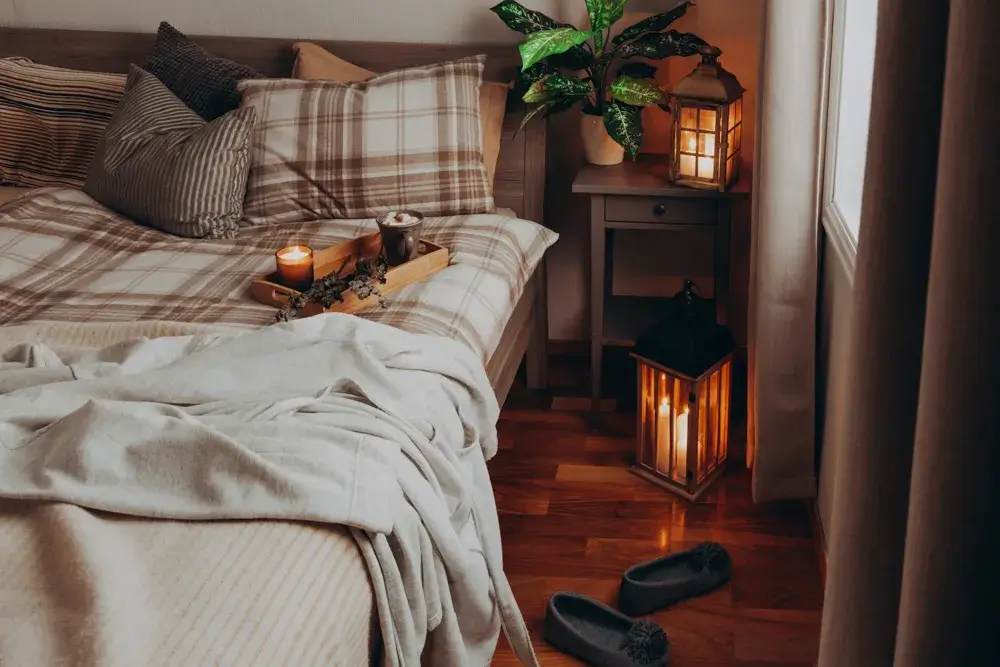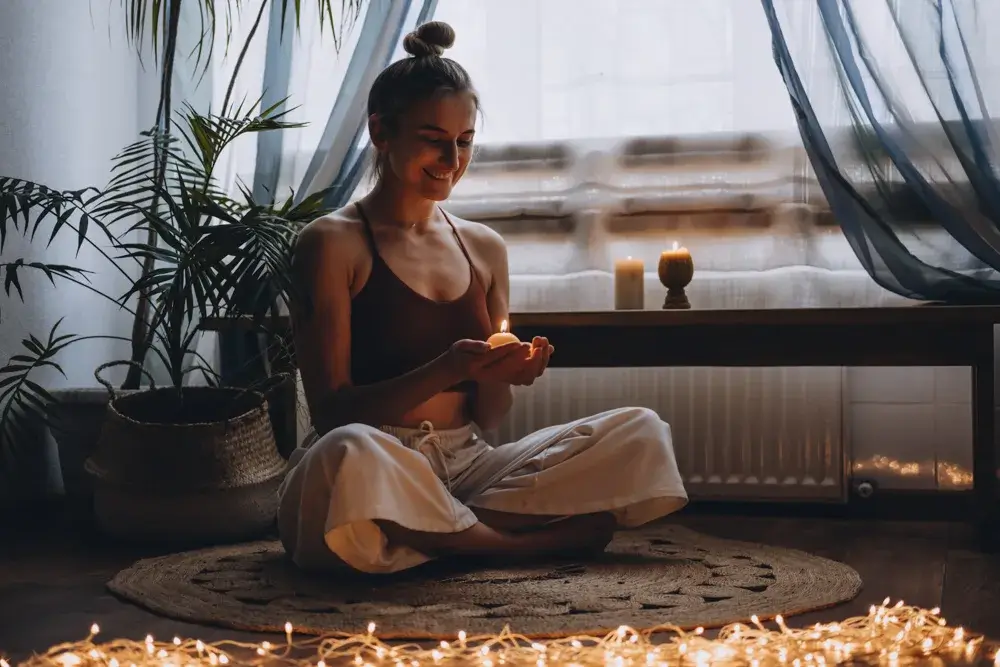Creating Your Ideal Evening Routine for a Peaceful Bedtime

Better evenings, better mornings.
Whether you’re a busy woman or an adult seeking a calm and tranquil nighttime routine, implementing a structured evening routine can make a world of difference in how you wind down and prepare for a restful night’s sleep.
Imagine ending your day on a peaceful note every night.
Sounds wonderful, doesn’t it? This is not just about getting better sleep. In fact, it’s about improving your whole life.
An evening routine is not just about bedtime. It’s about setting the stage for a peaceful and rejuvenating sleep.
And it doesn’t have to be complicated.
By dedicating time to self-care, incorporating mindful practices, and creating an optimal sleep environment, you can transform your evenings into a sanctuary of relaxation.
A peaceful bedtime doesn’t just lead to better sleep. It does so much more. In fact, it can improve your mental health, making you feel more balanced and less stressed. It can boost your productivity for the next day.
You wake up feeling refreshed, ready to tackle anything that comes your way.
Welcome to our guide on creating the perfect evening routine for better sleep, relaxation, and mindfulness. Join us as we explore the power of a consistent bedtime routine, mindful practices for a soothing evening, tips for an ideal sleep environment, and the importance of incorporating self-care into your nightly ritual.
Say goodbye to restless nights and hello to an evening routine that promotes better sleep and overall well-being.

Key Takeaways:
- Create a structured evening routine to promote better sleep and relaxation.
- Incorporate time for self-care to enhance your overall well-being.
- Implement mindful practices, such as journaling and mindfulness meditation, for a calming evening routine.
- Create an optimal sleep environment by making simple adjustments to your surroundings.
The Power of a Consistent Evening Routine.
A consistent evening routine can have a significant impact on your sleep quality and overall well-being.
- By incorporating a routine into your evenings, you create a structured and predictable environment that signals to your body and mind that it’s time to wind down and prepare for restful sleep.
- An ideal nighttime routine helps regulate your body’s internal clock, making it easier to fall asleep and wake up naturally.
- It enables you to establish healthy evening habits that promote relaxation, reduce stress, and optimize sleep quality.
Whether you’re a night owl or an early bird, implementing a bedtime routine tailored to your preferences can create a peaceful transition from the busyness of the day to a night of rejuvenating sleep.
Improving Sleep through Routine
Winding down the same time everyday results in good night sleep.
- Implementing a consistent evening routine can significantly improve your sleep quality. Our bodies crave routines as they provide a sense of security and stability. When we follow a regular sleep pattern, it enhances our ability to fall asleep quickly and experience continuous deep sleep, leading to better overall sleep quality.
- When you establish a routine, your body starts to recognize the various cues and signals associated with winding down. This prepares your mind and body for rest, making it easier to relax and let go of any residual stress or tension.
By following a routine, you create a psychological and physiological association between certain activities and sleep, making it easier to transition from wakefulness to slumber.

Creating the Best Evening Routine
Implementing a bedtime routine doesn’t have to be complicated or time-consuming.
Here are some tips and ideas to help you create an ideal nighttime routine:
- Set a consistent sleep schedule: Go to bed and wake up at the same time every day, even on weekends.
- Unwind with relaxation techniques: Engage in calming activities such as reading a book, taking a warm bath, or practicing gentle stretching.
- Avoid electronic devices: Minimize exposure to screens, including smartphones, tablets, and TVs, in the hour before bed.
- Create a sleep-friendly environment: Make your bedroom a quiet, dark, and comfortable space by using earplugs, eye masks, and cozy bedding.
- Limit caffeine and alcohol consumption: Reduce or avoid consuming caffeinated beverages or alcoholic drinks close to bedtime as they can disrupt sleep.
By implementing a bedtime routine that incorporates these tips and aligns with your preferences, you can create an ideal nighttime routine that sets the stage for a restful and rejuvenating sleep experience.

Mindful Practices for a Relaxing Evening Routine.
Creating a soothing and restful nighttime routine can set the stage for a better sleep and help you relax after a long day.
By incorporating mindful practices into your evening habits, you can promote relaxation and prepare your mind and body for a restful night’s sleep.
Here are a few activities to consider:
1. Journaling
Spending time journaling before bed can be a great way to reflect on your day and release any thoughts or worries that might be keeping you awake.
- Find a quiet and comfortable space
- Grab your favorite journal or notebook
- Begin writing down your thoughts, feelings, or even a gratitude list
This practice can help you unwind, clear your mind, and promote a sense of calmness.

2. Mindfulness Meditation
Make meditation a regular part of your life.
Mindfulness meditation is a technique that involves focusing your attention on the present moment, without judgment.
- Find a quiet place
- Sit comfortably
- Begin by focusing on your breath.
- Notice each inhale and exhale, letting go of any thoughts or distractions that may arise
Engaging in mindfulness meditation can help reduce stress, promote relaxation, and prepare your mind for a restful night’s sleep.

3. Soothing Activities
Engaging in soothing activities before bed can help signal to your body that it’s time to relax and unwind.
Consider taking a warm bath or shower, listening to calming music, practicing gentle stretching or yoga, or enjoying a cup of herbal tea. These activities can help soothe your senses and create a peaceful atmosphere for a restful sleep.
By incorporating these mindful practices into your evening routine, you can create a restful and relaxing nighttime routine that promotes better sleep. Experiment with different activities and find what works best for you.
Remember to give yourself at least an hour before bed to wind down and prepare for a restful night’s sleep.

Tips for an Optimal Sleep Environment.
Your sleep environment plays a crucial role in the quality of your sleep. Creating an optimal sleep environment can greatly improve your chances of getting a restful night’s sleep.
Here are some tips to help you create the perfect sleep environment:
1. Designated Evening Time to Prepare for Sleep
Set aside at least an hour before bedtime to wind down and prepare your mind and body for sleep. Establishing a regular evening routine signals to your body that it’s time to relax and unwind.
This routine can include activities such as taking a warm bath, reading a book, or practicing relaxation techniques like deep breathing or gentle stretching.
2. Use White Noise
White noise can be a useful tool to mask external noises that may disrupt your sleep. It creates a consistent and calming background sound that can help you relax and fall asleep faster.
You can use a white noise machine or even try apps or websites that offer a variety of soothing sounds, such as rainfall or ocean waves.
3. Invest in Blackout Curtains
Your sleep sanctuary should include a dark room. Blocking out external light sources is essential for creating a dark and conducive sleep environment. Blackout curtains can effectively prevent light from entering your room, helping you sleep better.
They are designed to block out both natural and artificial light sources, enhancing your chances of experiencing uninterrupted sleep.
4. Keep Your Sleep Space Clean and Clutter-Free
A cluttered and messy sleep environment can add unnecessary stress and anxiety, making it harder to relax and fall asleep.
Take the time to tidy up your sleep space, keeping surfaces clear and creating a serene atmosphere.
Having a clean and organized sleep space promotes a sense of calm and tranquility, making it easier to drift off to sleep.

5. Optimize Temperature and Humidity
The ideal sleep environment is cool, quiet, and well-ventilated.
Adjusting the temperature and humidity in your bedroom can significantly impact your sleep quality. Aim for a temperature between 60-67°F (15-19°C) and ensure proper ventilation through the use of fans or air conditioners.
Additionally, using a humidifier or dehumidifier can help maintain an optimal level of humidity for a comfortable sleep environment.
6. Choose Comfortable Bedding and Mattress
Don’t underestimate the power of comfortable mattress and pillows.
Investing in a good quality mattress and comfortable bedding is essential for a restful sleep environment. Your mattress should provide adequate support for your body and promote proper spinal alignment.
Opt for bedding materials that suit your personal preferences, such as breathable cotton sheets and pillows that provide the desired level of firmness or softness.
Incorporating Self-Care into Your Nighttime Routine.
When it comes to prioritizing your well-being, self-care is essential. By incorporating self-care activities into your evening routine, you can enhance your overall sense of relaxation and promote a better quality sleep.
Taking the time to care for yourself before bed can have a profound impact on your mind and body, setting the stage for a restful night’s sleep and a rejuvenated morning.
Skincare Routine
A skincare routine is not only beneficial for your skin but also as a way to unwind and pamper yourself before bed.
Consider creating a simple yet effective skincare routine tailored to your skin’s needs.
- Cleanse your face
- Apply a nourishing moisturizer
- Add a calming face mask once or twice a week
Treating yourself to a little skincare indulgence can help calm your mind and promote a sense of tranquility.

Relaxation Techniques
Engaging in relaxation techniques can help calm the mind and prepare your body for a peaceful sleep. Experiment with various techniques to find what works best for you.
Some options include:
- Deep breathing exercises
- Gentle stretching
- Practicing mindfulness meditation
These practices can help reduce stress and promote a sense of calm, enabling you to unwind and let go of the day’s worries.
Creating a Calming Atmosphere
Enhancing your evening routine with a calming atmosphere can work wonders for your sleep quality. Dim the lights in your bedroom and turn on soft, soothing music.
You can also incorporate aromatherapy by using essential oils known for their relaxing properties, such as lavender or chamomile.
These small adjustments to your environment can create a sense of tranquility and signal to your body that it’s time to wind down.
Bedtime Rituals
Developing bedtime rituals can be an excellent way to incorporate self-care into your evening routine.
This could include:
- Reading a book
- Taking a warm bath
- Sipping a cup of herbal tea
- Practicing gentle yoga
Choose activities that you enjoy and find relaxing, as these rituals will help signal to your body and mind that it’s time to relax and prepare for quality sleep.
By integrating self-care into your evening routine, you can create a nurturing space for yourself, promoting relaxation and calmness. Remember that consistency is crucial, so aim to make these activities a regular part of your bedtime routine. Embrace the opportunity to care for yourself and enjoy the positive impact on your overall well-being and the quality of your sleep.

Step-by-Step Guide to Crafting Your Evening Routine for Better Sleep
Crafting an effective evening routine is a powerful way to ensure you get enough sleep and wake up feeling refreshed.
Let’s explore how to create a routine that not only helps you unwind but also sets the stage for a peaceful night and a productive morning.
Step 1: Reflect on Your Current Habits
First, take some time each evening to think about your current night routine. What activities do you usually do?
Make a to-do list of these habits and review which ones help you feel relaxed and which might be keeping you awake. For example, if scrolling through your phone makes it harder for you to fall asleep, consider replacing that habit with reading a book or practicing regular meditation.
Reflection is a key step in creating routines for adults that truly enhance well-being.
Step 2: Prioritize Relaxation
A mindful evening routine prioritizes activities that prepare you for sleep.
Think about what calms you down. Maybe it’s taking a warm bath or doing some gentle yoga stretches. Whatever it is, prioritize these activities in the last hour or two before bed.
This is crucial because activities that reduce stress and minimize blue light exposure can significantly help improve sleep quality.
Step 3: Embrace Consistency
For your routine to help you get enough sleep regularly, consistency is crucial. Try to go to bed and wake up at the same time each day, even on weekends.
This helps regulate your body’s clock and can improve your overall sleep quality.
Consistency in your evening habits, like brushing your teeth and then reading a book for 30 minutes, can make falling asleep each night easier.
Step 4: Allow for Flexibility
Life is unpredictable.
- Sometimes, you may need to stay up later than usual, or you might not have time for your full routine. When this happens, try to maintain at least part of your routine to help you feel ready for bed.
- If you usually meditate for 15 minutes, but you’re short on time, even a five-minute session can make a difference. Flexibility means adapting your evening to prepare for sleep, regardless of how much time you have.
Incorporating these steps into your evening helps you create a night routine that supports both your sleep and your overall well-being. Remember, the goal is not just to try to fall asleep but to nurture habits that ensure you regularly get a good night’s rest. Whether it’s limiting your exposure to blue light 2 hours before bed or jotting down a few things that went well that day, each part of your routine can help you end the day on a positive note.
Creating a better bedtime routine doesn’t happen overnight.
- It takes patience and a willingness to experiment with different activities to see what works best for you.
- Over time, you’ll find that a consistent, flexible approach to your evening routine can make a big difference in how quickly you drift off to sleep and how rested you feel the next day.
Remember, a peaceful bedtime routine isn’t just about the hours of sleep you get. It’s about how those hours improve your day-to-day life.

Troubleshooting Common Challenges in Establishing an Evening Routine
Creating a seamless evening routine can sometimes feel like a puzzle, especially when common challenges pop up. But with a few adjustments, you can overcome these obstacles and build habits into your evening that lead to restful nights.
Let’s explore practical solutions for crafting a great routine.
- Lack of Time: One of the biggest hurdles is feeling you don’t have enough time at night. To tackle this, review your evening activities and prioritize. Can you shift less important tasks to another time? Dedicate a routine every night, even if it’s just 15 minutes, to help signal to your body it’s time to wind down.
- Disconnecting from Technology: Many people find it hard to put their phones or laptops away. Yet, the blue light from screens can disrupt your sleep cycle. Try setting a technology curfew an hour before bed. This is a habit that, when incorporated into your nightly routine, can significantly improve the quality of your sleep. Use this tech-free time to brush your teeth, prepare for the next day, or reflect on things that happened that day.
- Evening Energy Spikes: Sometimes, you might feel too energized at night. If this is the case, try taking a gentle walk after dinner or doing some light stretching. These activities can help expend extra energy and prepare your body for sleep.
The Role of Nutrition and Diet in Your Evening Routine
What you eat and drink before bed can lead to indigestion or discomfort, disrupting your sleep.
- Steer clear of heavy, rich foods, caffeine, and alcohol close to bedtime.
- Instead, consider light snacks that may help you fall asleep, like a small bowl of whole-grain cereal with milk or a banana. These can provide the right amount of nutrients to keep you satisfied without upsetting your stomach as your head hits the pillow.
- Staying hydrated is essential, but try to limit fluids an hour before bed to avoid nighttime trips to the bathroom. These small dietary adjustments can make a big difference in the quality of sleep you get, ensuring you wake up feeling refreshed.

Technology and Sleep: Finding the Right Balance
Screens are a big part of our lives, but their impact on sleep can’t be ignored.
The blue light emitted can keep you awake longer than you’d like.
- To counteract this, make your bedroom a screen-free zone or use features like “night mode” on devices to reduce blue light exposure in the evening.
- Instead of scrolling or watching TV, integrate tech-free activities into your new evening routine. This could be anything from reading a book to practicing meditation or simply chatting with your family members. Engaging in these activities can not only improve your sleep on a regular basis but also strengthen your relationships and personal well-being.
- Engaging kids in this routine can also be beneficial. For example, instead of screen time, encourage reading or quiet play in the evening. Establishing such night routines helps everyone in the family get the right amount of sleep.
Remember, the goal is to create a routine that feels right for you and evolves with your needs, helping you end each day on a high note and prepare for the next with energy and positivity.

Conclusion
Creating an optimal evening routine has powerful benefits that go beyond the bedroom.
By implementing a consistent routine, incorporating mindful practices, creating an optimal sleep environment, and incorporating self-care, you can set the stage for a peaceful bedtime and wake up feeling refreshed.
Take the time to reflect on your current evening routine and make adjustments to improve your sleep habits and overall well-being.
A good night’s sleep has a positive impact on your physical and mental health, so building a better evening routine is well worth the effort.
Remember, creating an ideal evening routine is all about finding what works best for you. Experiment with different activities and techniques to discover what helps you relax and unwind before bed.
Sweet dreams await as you embark on your journey to better sleep and a more rejuvenating evening routine.
FAQ
Why is an evening routine important?
An evening routine is important because it helps signal to your body that it’s time to wind down and prepare for sleep. It can help you relax, calm your mind, and improve the quality of your sleep.
How can a bedtime routine benefit women?
A bedtime routine can benefit women by providing a dedicated time for self-care, relaxation, and reflection. It gives women an opportunity to prioritize their well-being and create a sense of calm before bed.
How can an evening routine benefit adults?
An evening routine can benefit adults by helping them establish good sleep habits, reduce stress, and improve overall well-being. It allows adults to wind down after a busy day and promote restful sleep.
What activities can I include in my evening routine?
You can include activities such as journaling, reading, practicing mindfulness meditation, taking a warm bath, or enjoying a cup of herbal tea. The key is to choose activities that help you relax and prepare for sleep.
How much time should I dedicate to my evening routine?
It is recommended to dedicate at least an hour before bedtime to your evening routine. This allows enough time to unwind, engage in relaxing activities, and prepare your mind and body for sleep.
How can I create an optimal sleep environment?
To create an optimal sleep environment, you can try using white noise or blackout curtains to block out external stimuli, keeping your bedroom cool and dark, and creating a soothing atmosphere that promotes relaxation.
Can a skincare routine be part of my evening routine?
Absolutely! Incorporating a skincare routine into your evening routine can be a form of self-care and relaxation. It can involve cleansing, moisturizing, and taking care of your skin, which can contribute to a more calming and rejuvenating evening routine.
How can I implement mindfulness into my evening routine?
Mindfulness can be incorporated into your evening routine through practices such as mindfulness meditation, deep breathing exercises, or simply taking a few moments to reflect on the day and appreciate the present moment.
What can I do if I struggle to fall asleep?
If you struggle to fall asleep, you can try techniques like deep breathing, progressive muscle relaxation, or listening to soothing music or a guided sleep meditation. Establishing a consistent bedtime routine and creating a calming sleep environment can also help.
How can an ideal evening routine improve sleep quality?
An ideal evening routine can improve sleep quality by preparing your mind and body for sleep, reducing stress and anxiety, and creating a sense of calm. It helps signal to your body that it’s time to rest and promotes a more restful and rejuvenating night’s sleep.